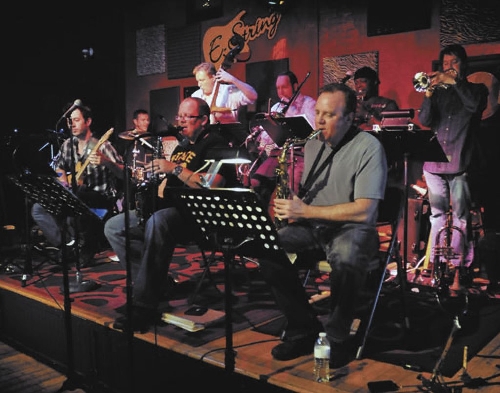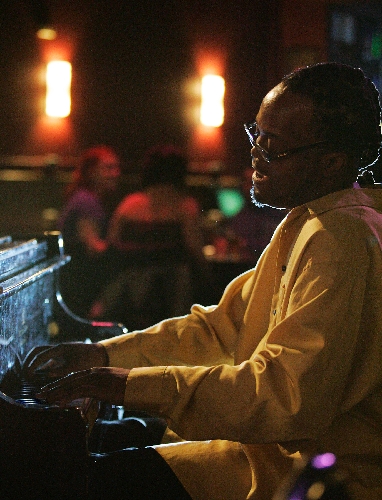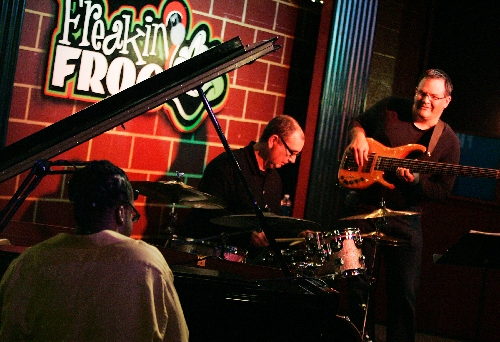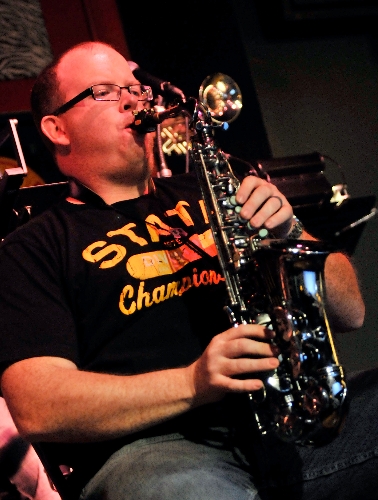Club closures, money issues, radio changes affect jazz scene





Once the word was slang for sex. (“Jazz me, baby, all night long.”)
Onstage, there’s strenuous lovemaking – musically speaking — happening here. Deliciously lewd, writhing up and down the trombone slide – waaa-waaa-waaa-Waaaaaaaa — a solo nearly conjures a striptease on “Makin’ Whoopee.”
Dimly cozy, but with a distracting sliver of sunlight slipping through the door on a Saturday afternoon, Henderson’s E-String Grill hosts the Las Vegas Mystery Band, its name owing to the shifting roster of players each month, flapping their jazz chops far from bill-paying gigs at “Jersey Boys” and “The Rat Pack is Back.” Their chops are boppin’, too.
“You guys got it goin’ today!” yells a patron, nodding and slapping his hand in rhythm on his table.
A trumpet solo dances around the bass line and drumbeat like a kid skipping around the maypole on Dizzy Gillespie’s “Tour de Force.” Bouncing along the mirthful melody of “It’s De-Lovely,” the band explodes into a brassy BA-DA-BLAM! that Cole Porter likely never imagined. Signaling his soloists on a smokin’ Thad Jones arrangement of “Tuning Up,” leader Alex Jackson turns toward a sax man who rips into an octave-scraping solo that could blow a grizzly bear back on its haunches. And yet …
“It’s getting real tough,” says Jackson — a saxophonist with Wayne Newton throughout his Tropicana gig – during downtime at the Grill’s bar. “A lot of the audience we get who appreciate the music are musicians themselves. It’s a labor of love, and for the owners, too. They make a very small profit, if anything.”
■ ■ ■
That jazz – the bebop/big band/old-school style — barely has America’s ear is no hot headline, but in our entertainment hot spot, home to jazz musicians spanning old to new Vegas, recent developments have left some of the ooh-bop-sh-bam faithful downright downbeat.
Several jazz venues shut down, including Mrs. Geez on Decatur Boulevard, Chianti Cafe in Summerlin and Daddy Mac’s in Henderson, the latter reopening, but minus its jazz offerings.
“Old-school bebop is quite difficult, but if we can break even on it and expose the artists, we’re comfortable with that,” says Ron Mancuso, who operates the Bootlegger Bistro, which features jazz performers including his father, veteran musician Gus Mancuso.
“My father jokes, ‘Are you sure you want to book jazz musicians? Before a club closes, they always book jazz musicians.’ ”
Widely noticed was a weekday realignment of jazz lifeline KUNV-FM, 91.5, adopting what’s variously called – in various degrees of admiration and disdain – fusion/smooth/contemporary jazz, relegating the older, venerated style to evenings and overnights.
“It’s on the decline,” says Frank Leone, president of Musicians Union Local 369 and Vegas Jazz (formerly the Las Vegas Jazz Society), about the jazz scene. “There’s a parsimony in the jazz community. Everyone wants to listen but no one wants to cough it up. But there’s no free ride anymore.”
Tight pockets and aging fans? Twin factors partially playing into club and radio issues. “It’s been so tough to work with straight-ahead jazz, which is an older listenership, because we don’t get enough listeners to become members,” says KUNV general manager David Reese. “We’ve struggled for years and tried to tell our listeners that. If I looked at the total number of bodies listening out there, there are enough to support it. But when it comes to saying it’s not free, it’s member-supported, we couldn’t come up with a compelling enough reason — or maybe they thought it would be here forever.”
Formerly the format of KOAS-FM, 105.7 (“The Oasis”), KUNV’s new music leaves most older jazz fans and “purists” disenfranchised during the day. “It’s not the kind of jazz we find significant or meaningful,” Leone says. “Not that the artists don’t have ability, but it has a limited harmonic palette, two or three chord progressions. You might call it elevator music jazz.”
Numerous bars, restaurants and casino lounges remain as occasional old-school jazz outlets (as well as formal venues such as the Winchester Center, library theaters and the University of Nevada, Las Vegas), but the local club circuit is often financially problematic.
“Most of the jazz (patrons) are older, they don’t drink anymore, maybe they’re on a fixed income,” says Marsha Norman, who produces jazz at the E-String Grill, charging $10 a head at the door for the Mystery Band, the money split among the musicians, who are otherwise unpaid.
“The owner can bring in $1,500 in karaoke a night. But he can’t book a band for $300 if for what people buy in food and drink, he only makes 80 bucks. It’s a sad Catch-22. If they hold out for pay, they don’t get to play and folks won’t get to hear them.”
Adds Leone: “It’s a rehearsal situation, for kicks. There’s a psychology of doing something live in front of people. Anything other than that, it’s prohibitive from a financial standpoint.”
■ ■ ■
Cat speaks his own language. Goes like this: “BA-dop (pause), BA-dop, BA-dop, baaaa-DOP! … BA-dop (pause), BA-dop, BA-dop, baaaa-DOP!” That’s the vernacular of the classic “C Jam Blues,” translated by pianist Vernell Brown Jr.
On this Thursday night at the Freakin’ Frog on South Maryland Parkway, across from UNLV, his trio — in front of two dozen patrons, some attentive, some not — is blissfully wrapped in its jazzy cocoon.
Body a ramrod-straight metronome as he rocks slightly in place, Brown takes flight on a solo, a sheet of chords cascading through his nimble fingers, triggering a wisp of a smile. Through a repertoire that also includes Eddie Harris’ “Freedom Jazz Dance” and John Coltrane’s “Giant Steps,” bassist Chris Hermes, eyes nearly closed, nods and grooves, nods and grooves, a jazz bobblehead doll, while drummer Joe Thomasula keeps rock-steady time and Brown, his lips now curled back into a tight grin, revels in the lightning-fast trill flying off his keyboard. Attention is paid. Applause arises from a few tables.
“I can’t play my music without it being a two-way street, we have to feed off each other,” Brown says between sets. “We’re holding out the banner, man. There aren’t many of us left.”
■ ■ ■
Operating off a different model, many Freakin’ Frog jazz players — including the Brown trio — aren’t paid. In any traditional sense, at least. “We invite bands to play here and the vast majority are development bands,” says Howard Kenig of Freakin’ Music, which produces shows for the Frog and maintains that just providing a stage for young musicians is a “huge value-added” opportunity twice-weekly. (He does pay a “core group” for open jams with other players on Tuesday nights.)
“We feed them, we drink them, we have a PR department that gets them media coverage. It’s no different than The Improv (for comedians). You come in, you try material. We’re offering them a venue and an audience so they can get ready for prime time.”
Leone flatly rejects it. “We have nothing but scorn for places like the Freakin’ Frog,” he says. “People who play in these places are seduced by the ambience and recognition of a live audience, while management cries poor. It serves musicians very poorly. I know Vernell, he’s a wonderful musician, but I feel sorry for him because someone should be paying him.”
Such brickbats, Kenig says, are misguided. “We’ve become the poster child for the bad guys,” he says, “and it’s gotten to the point where it’s humorous.”
Preferring to promote his jazz nights as “engaging with cool performers,” he notes that the word “jazz” is not helpful in drawing customers, partly because of the “closed and exclusionary” attitude of the local jazz community.
“If I put out a road sign with an arrow that said ‘Jazz,’ people would drive by so fast it would make your head spin,” Kenig says. “It’s jazz? Shhh. Don’t tell anybody. It’s just great music with a cool vibe and a place you can hang.”
■ ■ ■
Mystery Jazz Band’s no mystery today. Just magic. Muted trumpet solo, hushed and exquisitely seductive, weaves a sexy spell through the midtempo “Flight of the Foo Birds.” Lush, languorous chords stroke quieter passages of “Everything Happens to Me.” Foot-on-the-gas arrangement of “Somewhere in September” vrooms off the stage like a Ferrari on a joyride.
Tough finances? Radio pullouts? Club shutdowns? Yadda. Yadda. Yadda.
Right here? Right now?
Jazz ’em, baby, all night long.
Contact reporter Steve Bornfeld at sbornfeld@ reviewjournal.com or 702-383-0256.












